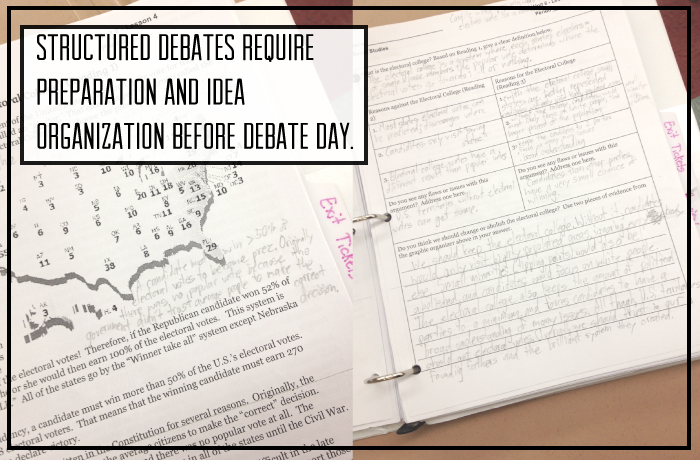Setting Up a Socratic Seminar
Middle school students are still learning the art of conversation, so when we as educators decide to have our class conduct a Socratic Seminar, we need to offer some structure to make sure that the debate offers a positive learning experience. I’ve had several debates over the years, some much better than others. In recent years, I realized that there were some crucial components to making sure that a debate, or a Socratic seminar, proved successful in my middle school classroom.
The students have to understand the topic of the seminar
I know, obvious, right? Maybe not so much. Say we want our students to debate whether the death penalty should be legal. Most students will have an initial opinion on this topic without any research. Most teachers will then require students to research that information so that they can be more aware of the arguments for both sides. However, unless we want to devote considerable time to the research process and the accessing and breaking down of information, the students will come away from their research with a really uneven amount of knowledge. Although I’d love to have time to have my students research every topic I have them debate, I’ve found that the process is too cumbersome. I want them to practice debating, and I want them to understand the topic they debate. Research is considered a separate assignment.
What I do
In order to make sure that my students are clear with their understanding, I actually write the articles they will read. I do my own research on the topics and create two one-page handouts that represent each side of the topic. When necessary, I cite statistics, and I keep track of my own sources. I make sure that the reading level is accessible, and they are a reasonable length. It is my goal that students are able to access all the ideas related to each side of the debate. Students read the articles in the days before the debate. Then, I make sure all students are ready for debating by reviewing the arguments in class. Students also develop their own viewpoint

The Socratic Seminar topic needs to be authentic
Whatever topic you pick, you need to make sure that you have an even-handed topic. The “right” side shouldn’t be obvious or clear. Really. I want my students altering their thinking during the debate, switching back and forth, weighing and reasoning each side. If one side has a clear advantage.
What I do
I pick topics that I find complex. The best topics are topics that have even sided arguments – arguments where they thinking really isn’t settled. I have two that I’ve published. Should the U.S keep the Electoral College? and Should we change the name of Columbus Day? Students can argue each side and still have a good argument.
All students should feel comfortable enough to talk during the debate
If you ever been in a classroom, ever, you know that some students talk more than others. This doesn’t change with your typical debate – even if the students know that it’s graded. I’ve found that most all willing to talk as long as they know the material. Some students just can’t interject, they just don’t have that type of personality. On the opposite end, some students love to talk – all the time – no matter whether anyone is listening.
What I do
Talking task cards! I try my best to avoid speaking on debate day. I want the students to interact with each other, and not with me. Therefore, they need to be provided with some structure that encourages them to interact. When the students enter the class on debate day, they each have four talking cards on their desks. Three of the cards instruct the students to add a point to the conversation. The last card requires them to ask a question. With this card, students can ask a question about the topic, or ask a question of each other. This where the more reluctant students enter the conversation. Students are able to add to the conversation when they are asked specific questions that they can answer.
Then, the cards have one more rule. The kids know, once you’ve used up your cards, you can’t talk. You can’t talk until everyone else has used up their cards. The students who love to talk use up their cards, and model the debate process for those students who are more reluctant. Then, the other students can join in the conversation.
The assessment needs to be authentic but simple
Folks, I’m a real living breathing active teacher. I love having my students debate, but I want those debates graded in class! I don’t want to have to record the debates, and then rewatch them while I eat dinner!
What I do
I developed a simple rubric to make sure that I can grade the students as they speak. Every time they make a comment in class, I make a mark somewhere on the rubric. If they make a really valuable comment, I add an X to the mastery column(5). If they speak just to speak, or they’re just repeating what someone else is said, then they earn a 3 or a 2. Students are encouraged to think and respond to other students’ ideas. They are reminded that this is the only way they can earn mastery.
That’s it! I hope this post encourages you to schedule a Socratic Seminar for your class. The students find them to be intensely fun, and they really learn!

